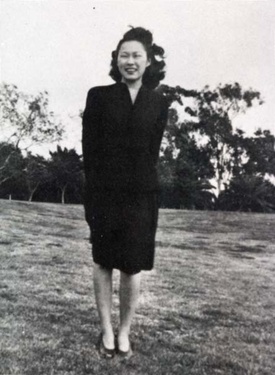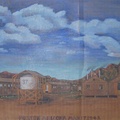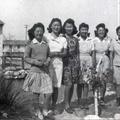We had been in Camp I of Poston, Arizona, for about five months when the Administration began recruiting labor for farms and canneries in permitted areas. I, like everyone else in camp, felt caged, so imprisoned, I jumped at every opportunity to get out. I applied for work leave. All those phrases: “group leave,” “short term leave,” “clearance,” “indefinite leave,” were a familiar part of camp life over half a century ago. Today, however, those desperate angry years seem like an excerpt from someone else’s dream; it’s hard to summon the youth and passion of the time, and those familiar phrases that were once so much a part of our language have faded along with the passion.
A group of us women volunteers on short term leave were sent to Provo, Utah to can tomatoes. It was October, 1942; already the weather had turned cold. I remember working outside shivering by a long conveyer belt, watching tomatoes wobbling by a dizzying pace. We were supposed to snatch the wormy ones, gouge out the holes, throw out the culls, and let the rest go to a steamer where other women, mostly white residents of Utah, sat at a turn table in a warm room and peeled the steamed tomatoes. We were housed in a barrack, exactly like the one we left in Poston; we had breakfast and were given a lunch bag, and we came “home” to a dinner remarkably like those we had in camp. And we slept in an unheated, non-insulated barrack.
Sometimes on weekends, a kindly permanent resident of Utah, Japanese of course, would invite us to a warm house for a country supper. At these gatherings we met other people from other camps and we spent a cheerful time with them talking about our lives “before camp.” Otherwise we stayed in the barrack or went shopping with the little money we earned. I bought a pair of brown high heeled, faux alligator shoes.
Before long, it began to snow and there was no way of keeping warm in the barrack. I remember wearing all my work clothes including my shoes to bed, and one night, still cold, I dragged a mattress over me. But it was too heavy; I couldn’t breathe so I had to kick it off.
That was the end of my experience in a Utah canning factory. The management sent us back to camp before our work leave expired. But youth is resilient and forgiving or at least forgetful, and I harbor no grief or self pity. All that remains today is in my mind’s eye, the memory of a pair of fake alligator pumps, the cold, and the kindness of strangers.
In April of 1943, I applied for clearance to go on “indefinite leave” to Chicago. My mother was very much against it because my father was in the hospital with bleeding ulcers, and my brother was in Tule Lake awaiting deportation and God knows what else. My sister returned to Poston to be with our dwindling family. She’d gone to Arkansas to marry a Nisei soldier.
But my need to be free was overwhelming. All my close friends had already left camp for eastern cities and I felt if I didn’t leave at that very moment, I would be stuck in camp forever. My mother finally agreed to let me go, but she said she was so disappointed, she couldn’t tell my father of my heartless decision. I nearly cried during my last visit at the hospital. Unaware of my mother’s terrible secret, he laughed self-consciously at my behavior.
In Chicago I worked at a card marking factory. They didn’t manufacture cards; they just marked them for dishonest gamblers. They also had a department that loaded dice tor dishonest crap shooters. I was fired the first day on the job. It was simple enough work but all the while I was marking cards, I was thinking that I was contributing to fraud. I worked a couple of hours, then in nervous guilt, I spilled ink all over my desk and ruined a carton of new cards. When I got back to the hostel where a bunch of us evacuees were living, I was giddy with relief. “I got fired!” I screamed happily.
My next job was at a candy factory working in the wrapper department. I ran a machine that made wrappers for Baby Ruth and Butterfingers. There were quite a few Japanese evacuees already employed there. We were given broken not salable candy to eat for lunch, but after work, the guard searched our belongings so we would not take candy home with us.
I was at the candy factory for two springs, two summers, and two cold winters. In Poston, my father did get better but when Hiroshima was bombed and the camps were ordered to close, the sorrow and suffering of his beloved country and the prospect of going out and trying to make a living, again from scratch, was too much for my father. My mother wired me that he was seriously ill and I was to come “home.” It took me three days on the primitive train. The night I arrived in Poston I heard the mourners leaving my father’s wake.
Poston was almost empty; there were only a few people at the funeral. A week later we boarded the train to San Diego, the last contingent of evacuees, the last destination for my father, now a small box of ashes on my mother’s lap.
In San Diego my sister, a crack stenographer, and I (largely unskilled) looked for jobs. In spite of huge help-wanted-will-train ads in the papers, we were not hired. One day we were returning to our trailers (we lived in federally owned trailers) very tired and discouraged when we saw a help-wanted sign in a window of a factory. We decided if we were told there was no job or that it was just now filled, we would say, ”Well then, you won’t be needing this,” and either she or I would tear up the sign. But there was no need for righteous indignation; we were hired.
The factory printed and developed snapshots. Eventually my sister became a crack printer and, though I was not so indispensable, a year later I joined the darkroom staff and we all struck for higher wages. We were fired as a group, white and yellow together, and we were all black-balled in the photo industry.
About 1947, I moved to Los Angeles hoping to get into an art school, but because of the many G.I.s returning from the wars and the G.I. Bill of Rights which gave them first rights to full admission, most of the schools were filled. I took a series of low-paying factory jobs to support myself; snipping loose threads in a pants factory (where I was sexually harassed, but who knew about women’s rights then?), filling department store orders, tying ribbons in a stationery factory, and hand painting shower curtains. At this factory I worked myself up to the top job but nearly lost it because the boss thought it wasn’t such a good idea to have an “oriental” as an art director. “It might offend the buyers,” he was heard to have said.
I asked myself why I should take such garbage from a rat-trap factory, especially with the boss himself being a Semite and having a working knowledge of racism, confronted him and he denied ever letting such words pass his lips. So he cornered himself into giving me the top job. I am the definitive Nisei woman, polite and long suffering, but keep me on a burner long enough and I will boil over. I did get the job, but I lost respect for the man and after a while the job held no appeal for me.
That was a long time ago. I have done other work since and I have come to the conclusion that racism and sexism along with professional jealously and competition exist wherever people and genders work together. I think it’s a human condition and is especially prevalent in societies where acquisition is the highest form of accomplishment.
*This article was originally published in Nanka Nikkei Voices: Resettlement Years 1945-1955, in May 1998. It may not be reprinted or copied or quoted without permission from the Japanese American Historical Society of Southern California.
© 1998 Japanese American Historical Society of Southern California






